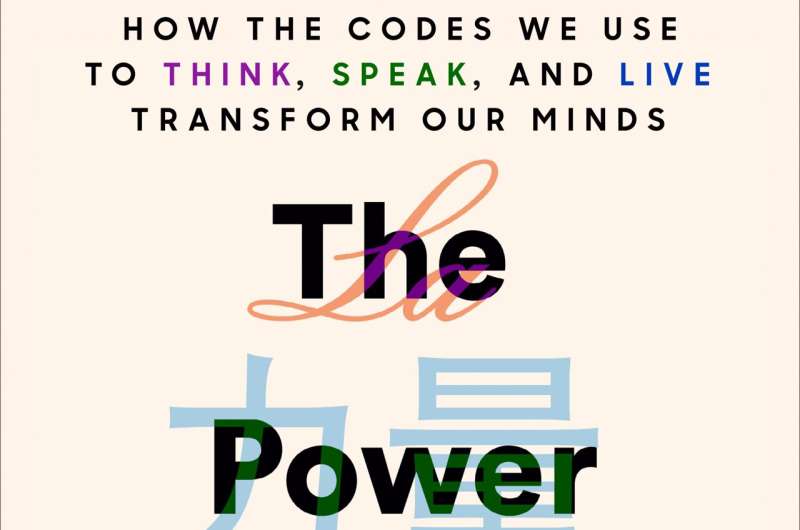This article has been reviewed according to Science X's editorial process and policies. Editors have highlighted the following attributes while ensuring the content's credibility:
fact-checked
trusted source
proofread
Why multilingualism is a 'superpower'

Viorica Marian knows the power of multilingualism firsthand. She grew up bilingual in Moldova—a small country nestled between Ukraine and Romania that was formerly a part of the Soviet Union—speaking Romanian at home and Russian in official settings.
Now, Marian is the Ralph and Jean Sundin Endowed Professor of Communication Sciences and Disorders at Northwestern's School of Communication. She's a psycholinguist who has studied language processing in the brain for decades, becoming a leading expert on bilingualism.
Marian's research has helped reveal the many cognitive implications and nuances of being bilingual, from changes to memory and perception to the impact of language on learning, emotions, identity and decision-making.
She spoke recently to Northwestern Now about her new popular science book, "The Power of Language: How the Codes We Use to Think, Speak, and Live Transform Our Minds," which explores the interaction between language and the human mind.
Tell us a little bit about your book and what inspired it.
Toni Morrison once said that if there's a book you want to read, but it hasn't been written yet, then you must write it. Most of the world's population is bilingual or multilingual: It's very common for people to grow up speaking two or more languages from early childhood and acquire additional languages later in life.
Yet, bilinguals and multilinguals do not usually find themselves represented in popular science books, and society in general lacks a thorough understanding of how knowing multiple languages shapes us.
I wanted bilinguals and multilinguals to better understand their brains. For those considering learning a new language, I also wanted them to know why that's a great idea.
What's one of your favorite examples of how multilingualism fosters creative thinking?
It's hard to pick a favorite example, because I love them all!
An interesting illustration comes from a study by psychologist Annette Karmiloff-Smith, who asked children aged four and five to draw flowers and houses that do not exist using their imaginations.
The drawings of monolingual children were more likely to leave out elements—think of flowers with fewer petals, or no stalk. The drawings of bilingual children were more likely to contain cross-category insertions—flowers that look like animals, or have a door.
It turned out that the bilingual children's drawings resembled the more complex patterns that monolingual children develop at a later age.
What are some of the other ways in which language impacts our brains?
One of the most striking recent discoveries in the neuroscience of multilingualism is that knowing more than one language delays Alzheimer's and other types of dementia by four to six years.
The constant juggling of two or more languages creates a more interconnected neural network that compensates functionally for anatomical deterioration. Imagine taking a certain bridge home every day after work for many years until one day that bridge collapses, and that route is no longer available to you.
If you live in an area where more than one bridge has been built over time, one collapse will not prevent you from reaching your destination because you can take alternative routes to reach your home. But if that is the only way that exists, you have a problem.
In the same way, if one pathway in the brain has decayed and is no longer available for accessing memories or information, a multilingual has other pathways that have been built over time as a result of the links between words, memories and experiences accumulated across two or more languages.
What do you feel makes the book especially timely?
If you can appreciate firsthand the utility and beauty of another language and culture because you are familiar with it, you are less prone to bigotry, to demonizing things or people who are different from you.
Engaging with a variety of languages gives us crucial abilities that humanity will need to heal burgeoning social discord and to formulate solutions to looming global problems: Think of Russia's efforts to erase Ukrainian language and culture on territory it has occupied, which seeks to undermine Ukrainian identity rooted in language.
Moreover, as we seek solutions to new problems, having different modes of thinking that come with multilingualism gives us a greater chance of finding answers, providing new perspectives, and conceiving innovative questions that will benefit humanity.
What would you say to people who are considering broadening the language horizons of themselves or their families?
I'd say, embrace more language diversity in your life whenever possible! Learning a language is easier than you might think.
There are many practical benefits to learning another language. It helps when traveling, can foster interpersonal or professional relationships with new people, and may even give you access to a wider dating pool or new professional opportunities. There is also a positive correlation between multilingualism and income.
Learning another language is a gift you can give yourself, one from which you will reap lifelong benefits. It is never too early or too late to learn another language—it may even be fun!
Provided by Northwestern University





















